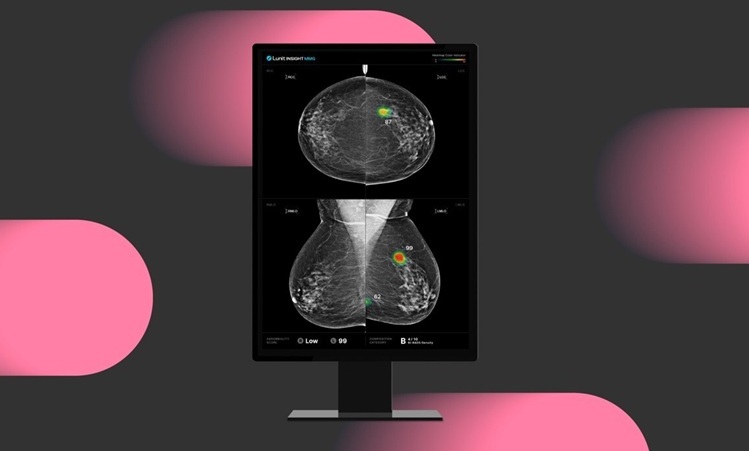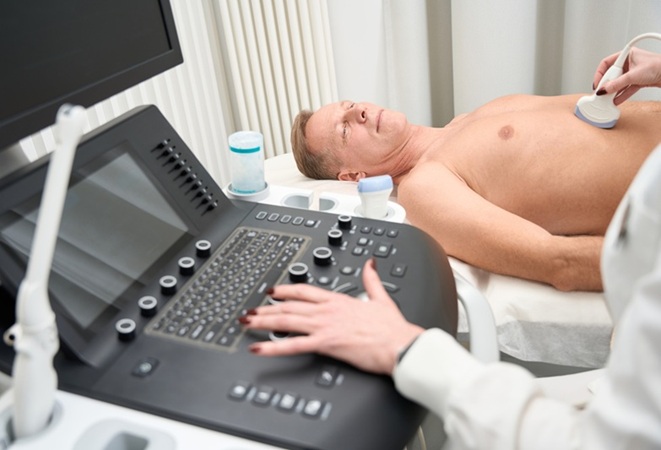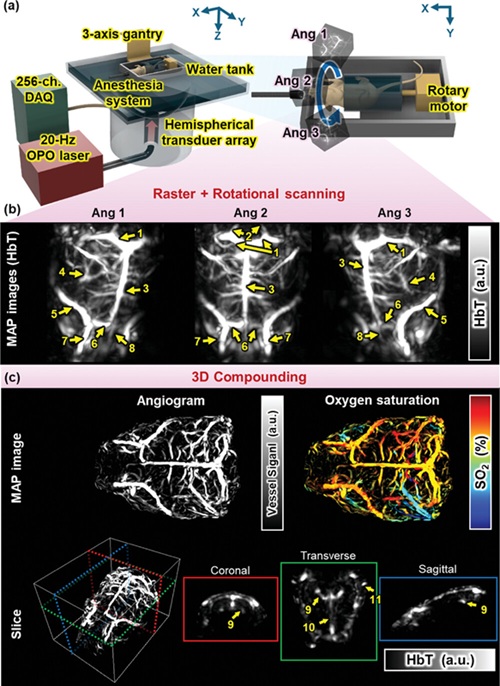Agfa Brings Intelligent Radiography to RSNA 2018
|
By MedImaging International staff writers Posted on 26 Nov 2018 |

Image: Agfa-Gevaert NV demonstrated its purpose-built Enterprise Imaging platform with advanced clinical applications at RSNA 2018 (Photo courtesy of Agfa-Gevaert).
At RSNA 2018, Agfa-Gevaert NV (Mortsel, Belgium) demonstrated its purpose-built Enterprise Imaging platform with advanced clinical applications that brings radiologists to the forefront with confident decision-making, and improved delivery of patient care. The company demonstrated developments in progress to its Enterprise Imaging platform, previewing how it will serve as the foundation to enable machine learning and evidence-based AI enabling task-based workflow automation, image analysis and predictive analytics.
The Enterprise Imaging platform removes traditional barriers to medical imaging, enables multi-specialty care team collaboration and enhanced cross-platform mobility. With embedded advanced applications and AI, Agfa's Enterprise Imaging solution will provide radiologists with additional information for decision-making, speedy access to results and analytics helping significantly improve the patient's care journey and satisfaction, as well as the organization's clinical, operational and financial well-being.
With the task-based rules engine, the aggregation of both imaging and non-imaging data from disparate healthcare information systems, and strong collaboration tools, radiologists can more efficiently make evidence-based decisions and recommendations, and play an enhanced role as consultant for physicians and patients. An approach to precision medicine, analytical intelligence and aggregation of imaging and non-imaging data at the Radiology Desktop will offer patient-centered personalized care delivery, based on analysis of outcomes of similar patient population and data sets.
"Whether detecting cancers or treating chronic diseases, machine learning and advanced analytics will help radiologists and diagnosticians focus less on manual tasks and more on improving care pathways," said Dr. Anjum Ahmed, Global Director Imaging Information Systems at Agfa HealthCare. "Agfa HealthCare's enhancements to the Enterprise Imaging platform, currently in development, will serve as the foundation to enable machine learning and evidence-based augmented intelligence. Unlike AI, which tries to replace human intelligence, augmented intelligence works with and amplifies human intelligence."
"The platform will serve as the intersection of machine learning and advanced applications, where clinical knowledge and medical data converge on a single platform. The potential benefits of augmented intelligence are realized when it is used in the context of workflows and systems that healthcare practitioners operate and interact with, hence introducing efficiencies," added Ahmed.
The Enterprise Imaging platform removes traditional barriers to medical imaging, enables multi-specialty care team collaboration and enhanced cross-platform mobility. With embedded advanced applications and AI, Agfa's Enterprise Imaging solution will provide radiologists with additional information for decision-making, speedy access to results and analytics helping significantly improve the patient's care journey and satisfaction, as well as the organization's clinical, operational and financial well-being.
With the task-based rules engine, the aggregation of both imaging and non-imaging data from disparate healthcare information systems, and strong collaboration tools, radiologists can more efficiently make evidence-based decisions and recommendations, and play an enhanced role as consultant for physicians and patients. An approach to precision medicine, analytical intelligence and aggregation of imaging and non-imaging data at the Radiology Desktop will offer patient-centered personalized care delivery, based on analysis of outcomes of similar patient population and data sets.
"Whether detecting cancers or treating chronic diseases, machine learning and advanced analytics will help radiologists and diagnosticians focus less on manual tasks and more on improving care pathways," said Dr. Anjum Ahmed, Global Director Imaging Information Systems at Agfa HealthCare. "Agfa HealthCare's enhancements to the Enterprise Imaging platform, currently in development, will serve as the foundation to enable machine learning and evidence-based augmented intelligence. Unlike AI, which tries to replace human intelligence, augmented intelligence works with and amplifies human intelligence."
"The platform will serve as the intersection of machine learning and advanced applications, where clinical knowledge and medical data converge on a single platform. The potential benefits of augmented intelligence are realized when it is used in the context of workflows and systems that healthcare practitioners operate and interact with, hence introducing efficiencies," added Ahmed.
Latest RSNA 2018 News
- New AI-Powered Lung Imaging Solution Launched at RSNA 2018
- Carestream Displays Several IT Offerings at Radiology Congress
- Double Black Imaging Announces Expanded Clinical LCD Line at Trade Show
- Lunit Unveils AI-Based Mammography Solution at RSNA 2018
- Guerbet Showcases Ongoing Collaboration with IBM Watson at Radiology Trade Fair
- Fujifilm Showcases New DR Detectors and AI Initiative in Chicago
- M*Modal Launches Cloud-Based Version of AI-Powered Reporting Solution
- MDW Unveils First Radiology Blockchain Platform at RSNA 2018
- Teledyne DALSA Displays Xineos Family of CMOS X-ray Detectors
- SuperSonic Imagine Showcases New Ultrasound System at RSNA 2018
- CIVCO Medical Solutions Introduces Next-Generation of Ultrasound Accessories
- Subtle Medical Showcases Al for PET and MRI Scans at RSNA 2018
- Philips Launches New Platform to Enable Development of AI Assets
Channels
Radiography
view channel
Higher Chest X-Ray Usage Catches Lung Cancer Earlier and Improves Survival
Lung cancer continues to be the leading cause of cancer-related deaths worldwide. While advanced technologies like CT scanners play a crucial role in detecting lung cancer, more accessible and affordable... Read more
AI-Powered Mammograms Predict Cardiovascular Risk
The U.S. Centers for Disease Control and Prevention recommends that women in middle age and older undergo a mammogram, which is an X-ray of the breast, every one or two years to screen for breast cancer.... Read moreMRI
view channel
Ultra-Powerful MRI Scans Enable Life-Changing Surgery in Treatment-Resistant Epileptic Patients
Approximately 360,000 individuals in the UK suffer from focal epilepsy, a condition in which seizures spread from one part of the brain. Around a third of these patients experience persistent seizures... Read more
AI-Powered MRI Technology Improves Parkinson’s Diagnoses
Current research shows that the accuracy of diagnosing Parkinson’s disease typically ranges from 55% to 78% within the first five years of assessment. This is partly due to the similarities shared by Parkinson’s... Read more
Biparametric MRI Combined with AI Enhances Detection of Clinically Significant Prostate Cancer
Artificial intelligence (AI) technologies are transforming the way medical images are analyzed, offering unprecedented capabilities in quantitatively extracting features that go beyond traditional visual... Read more
First-Of-Its-Kind AI-Driven Brain Imaging Platform to Better Guide Stroke Treatment Options
Each year, approximately 800,000 people in the U.S. experience strokes, with marginalized and minoritized groups being disproportionately affected. Strokes vary in terms of size and location within the... Read moreUltrasound
view channel
Tiny Magnetic Robot Takes 3D Scans from Deep Within Body
Colorectal cancer ranks as one of the leading causes of cancer-related mortality worldwide. However, when detected early, it is highly treatable. Now, a new minimally invasive technique could significantly... Read more
High Resolution Ultrasound Speeds Up Prostate Cancer Diagnosis
Each year, approximately one million prostate cancer biopsies are conducted across Europe, with similar numbers in the USA and around 100,000 in Canada. Most of these biopsies are performed using MRI images... Read more
World's First Wireless, Handheld, Whole-Body Ultrasound with Single PZT Transducer Makes Imaging More Accessible
Ultrasound devices play a vital role in the medical field, routinely used to examine the body's internal tissues and structures. While advancements have steadily improved ultrasound image quality and processing... Read moreNuclear Medicine
view channel
Novel Radiotracer Identifies Biomarker for Triple-Negative Breast Cancer
Triple-negative breast cancer (TNBC), which represents 15-20% of all breast cancer cases, is one of the most aggressive subtypes, with a five-year survival rate of about 40%. Due to its significant heterogeneity... Read more
Innovative PET Imaging Technique to Help Diagnose Neurodegeneration
Neurodegenerative diseases, such as amyotrophic lateral sclerosis (ALS) and Alzheimer’s disease, are often diagnosed only after physical symptoms appear, by which time treatment may no longer be effective.... Read moreGeneral/Advanced Imaging
view channel
AI Model Significantly Enhances Low-Dose CT Capabilities
Lung cancer remains one of the most challenging diseases, making early diagnosis vital for effective treatment. Fortunately, advancements in artificial intelligence (AI) are revolutionizing lung cancer... Read more
Ultra-Low Dose CT Aids Pneumonia Diagnosis in Immunocompromised Patients
Lung infections can be life-threatening for patients with weakened immune systems, making timely diagnosis crucial. While CT scans are considered the gold standard for detecting pneumonia, repeated scans... Read moreImaging IT
view channel
New Google Cloud Medical Imaging Suite Makes Imaging Healthcare Data More Accessible
Medical imaging is a critical tool used to diagnose patients, and there are billions of medical images scanned globally each year. Imaging data accounts for about 90% of all healthcare data1 and, until... Read more
Global AI in Medical Diagnostics Market to Be Driven by Demand for Image Recognition in Radiology
The global artificial intelligence (AI) in medical diagnostics market is expanding with early disease detection being one of its key applications and image recognition becoming a compelling consumer proposition... Read moreIndustry News
view channel
GE HealthCare and NVIDIA Collaboration to Reimagine Diagnostic Imaging
GE HealthCare (Chicago, IL, USA) has entered into a collaboration with NVIDIA (Santa Clara, CA, USA), expanding the existing relationship between the two companies to focus on pioneering innovation in... Read more
Patient-Specific 3D-Printed Phantoms Transform CT Imaging
New research has highlighted how anatomically precise, patient-specific 3D-printed phantoms are proving to be scalable, cost-effective, and efficient tools in the development of new CT scan algorithms... Read more
Siemens and Sectra Collaborate on Enhancing Radiology Workflows
Siemens Healthineers (Forchheim, Germany) and Sectra (Linköping, Sweden) have entered into a collaboration aimed at enhancing radiologists' diagnostic capabilities and, in turn, improving patient care... Read more
















![Image: [18F]3F4AP in a human subject after mild incomplete spinal cord injury (Photo courtesy of The Journal of Nuclear Medicine, DOI:10.2967/jnumed.124.268242) Image: [18F]3F4AP in a human subject after mild incomplete spinal cord injury (Photo courtesy of The Journal of Nuclear Medicine, DOI:10.2967/jnumed.124.268242)](https://globetechcdn.com/mobile_medicalimaging/images/stories/articles/article_images/2025-02-24/Brugarolas_F8.large.jpg)



